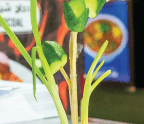At first it seems like nothing. Headaches. Slight loss of appetite. An overall weariness Emma tries to ignore as she goes to work, yoga, Whole Foods. She’s forty-two and has always taken good care of her body. She stretches daily. Avoids fried foods and sugar. Every morning, no matter the weather, she jogs on the bike path. The leaves are changing color and this year she’s really trying to appreciate them. She sees the yellows as godly, optimistic. The reds are blood, beauty, vanity, luxury. The purples are her favorite—a secret revelation.
It’s like art-slash-therapy, she thinks, strolling across campus. College kids weave around her in tight jeans and sweatshirts. They look stressed, fiddling with their AirPods, vaping like it’s life support. But she envies them a little. It’s Friday. She imagines them dancing at parties and waking up next to people they’ve just met.
Emma enters the squat brick building where she works as editor in chief of Paths, the alumni magazine for the school, which she didn’t attend but has, over the past decade, become inexorably enmeshed in, editing hundreds of articles plus a constant stream of announcements—births, deaths, and marriages. It’s steady work. It could be much worse. She makes herself coffee then holes up in her office, rereading a piece about a sheep farm that’s also a retreat for troubled teens. She answers emails until her head hurts and wears sunglasses to the afternoon meeting, waiting for an Advil to kick in. Marie and Arlo want the sheep for the cover. Dunkle and the intern want the stained glass. Everyone votes—sheep win.
Leaves blow in the wind as Emma walks back to her car. The students congregate around the pond, laughing and flirting. In the parking lot, birds feast on a fallen sandwich. Emma stops to watch, but her head still feels off. She must be living wrong. She needs to read more books, have more sex. Everything has become too rigid. Tendencies became habits, which somehow became rules. The sun sets in wide pink bands on her drive home. She should try a new restaurant, she thinks. Call an old friend. Show just a little more cleavage, though she’s never shown much.
Emma pulls into the driveway of a white house with blue shutters. When she and Miles bought it, they thought they might have children or host parties, but it’s usually just the two of them, debating how to most efficiently load the dishwasher. She walks through the garage and takes the steps down into the basement, listening to the thump of Miles’s orthopedic sneakers. He always gets home before her and runs on the treadmill, watching Antiques Roadshow or Bill Maher or baseball.
He turns when he sees her but doesn’t stop. He’s wearing a T-shirt from the IT company he works for and black sweatpants with holes at the knees. He’s forty-seven and in decent shape. His hair’s still there, but the gray patches make him self-conscious. On the TV, someone points out water damage on an old chest of drawers. Emma and Miles wait to hear how much it’s worth—three thousand dollars. More than Emma expected, but the man seems disappointed.
“Let’s go out tonight,” she says.
“Weren’t we going to make fish?”
“I never went to the store.”
“Salmon’s in the freezer.”
“But there’s nothing to go with it.”
“Fine,” he says, looking back at the screen. “GG or Chinese?”
They eat at the Garden Grill without much to say. After fifteen years, Emma knows what he’ll think about something before she tells him, so sometimes she doesn’t tell him. She has her little secrets—a tattooed woman at yoga who winks at her, an eighthundred-dollar jacket she said was two hundred, late-night searches that take her deep into wild Reddit threads.
After dinner, they try to watch something but can’t agree on what and end up reading in separate rooms. She finally begins , only checking her phone a few times. They brush their teeth then get into bed and hold hands. She can’t remember the last


